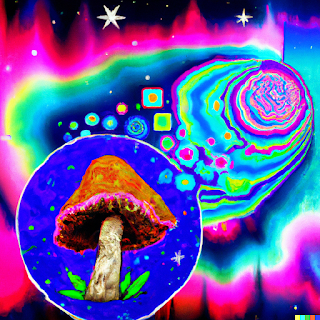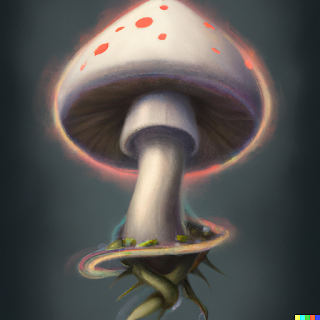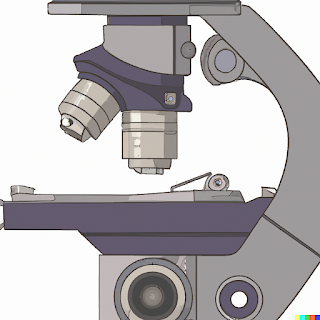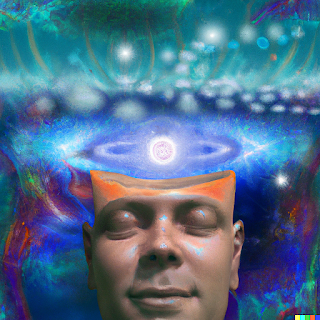Mushrooms, psilocybin and the human brain
Psilocybin, the psychoactive compound found in psychedelic mushrooms, interacts with receptors in the brain that are involved in the regulation of mood, perception, and cognition. Specifically, psilocybin binds to serotonin receptors, which can cause changes in the activity of certain brain regions, leading to altered perceptions and experiences.
It is not entirely clear what evolutionary purpose the
psychoactive compounds in mushrooms serve, as they do not appear to be
necessary for the survival or reproduction of the fungus. However, some
researchers have suggested a few potential explanations:
- Defense
mechanism: One hypothesis is that the psychoactive compounds in mushrooms
may act as a defense mechanism against predators, such as insects or
animals, that might try to eat them. By producing chemicals that alter the
perceptions or behavior of predators, the mushrooms may be able to avoid
being consumed.
- Symbiosis
with insects: Another theory is that the psychoactive compounds in
mushrooms may have evolved to interact with insects that are involved in
the dispersal of spores. For example, some mushrooms have been found to
contain compounds that are attractive to certain types of insects, which
then carry the spores to new locations.
- Random
genetic mutation: It is also possible that the evolution of psychoactive
compounds in mushrooms was simply a byproduct of random genetic mutations,
rather than an adaptation to any specific environmental pressures.
It's worth noting that while the evolutionary reasons for
the existence of these compounds in mushrooms is not entirely clear, they have
been used for medicinal and spiritual purposes by humans for centuries, and
recent research suggests they may have therapeutic potential for certain mental
health conditions.
Recent studies have suggested that psilocybin, the psychoactive compound found in many species of mushrooms, may have potential as a treatment for a variety of mental health conditions, including depression, anxiety, and addiction.
One of the ways that psilocybin may be beneficial is by
altering the activity of certain regions in the brain that are involved in mood
regulation and self-reflection. Studies using brain imaging techniques have
shown that psilocybin can increase activity in the default mode network, a
group of brain regions that is typically active when a person is thinking about
themselves and their personal experiences. This increase in activity is thought
to lead to increased self-awareness and an expanded sense of identity, which
may be helpful in treating conditions like depression and addiction.
Psilocybin has also been found to reduce activity in the
amygdala, a brain region that is involved in fear and anxiety responses. This
reduction in activity may explain why psilocybin has been shown to reduce
symptoms of anxiety in some people.
It's important to note that while the therapeutic potential of psilocybin is promising, more research is needed to fully understand its effects and to develop safe and effective treatments. It's also worth noting that psilocybin is currently illegal in many countries, and should only be used under the supervision of a trained healthcare professional.




Comments
Post a Comment